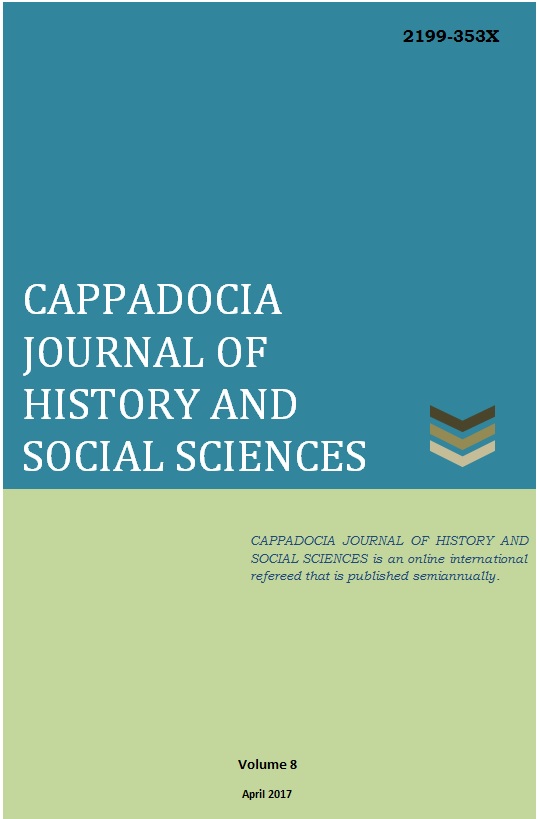Author :
Abstract
Birinci Dünya Savaşı sırasında İngiltere ve Fransa arasında 1916 yılında akd edilen Sykes Picot Antlaşmasına göre Irak, Fransız nufuz bölgesi içinde kalmıştı. Fakat bu anlaşma daha sonra İngilizler tarafından özellikle petrol bölgelerinin daha net belirlenmesinden sonra başarısız bir anlaşma olarak değerlendirildi. Savaştan sonra Ortadoğu’nun kaderini belirleyen 1920 San Remo Konferansı’nda İngilizler bu durumu telafi etti. Basra, Bağdat ve Musul bölgelerinden oluşan Irak üzerinde, mandaterlik hakkını ele geçiren İngilizler zengin petrol bölgelerine egemen oldular. Fakat Irak halkı İngilizlerin kendi ülkelerindeki mandaterliğine karşı çıktı ve 1920 isyanı ile mandeterliğe karşı tepkilerini ortaya koydular. Bu durum İngilizleri bölgede çok zor bir duruma düşürdü. İngilizler 1921 Kahire Konferansında bu konuyu ele aldılar ve katı manda uygulamasından vazgeçtiler. Böylece İngilizler Irak’ta daha yumuşak bir yönetim anlayışı geliştirerek Mandaterlik fikrini Iraklıların zihninden silmek istediler. Bunun için Irak’ta yerel ve nüfuzlu unsurların söz sahibi olduğu daha ılımlı bir yönetim anlayışını benimsediler. Bu yönetim anlayışı petrol şehri olan ve çoğunluğunu Türkmenlerin oluşturduğu Kerkük için de kısmen uygulandı. Fakat Lozan Konferansı sonunda Türkiye ile İngiltere arasında ortaya çıkan Musul meselesi nedeniyle İngilizler, Kerkük ve Türkmenlere karşı tutumlarını değiştirdi. İşte biz bu makalede Lozan Konferansı öncesi ve sonrasında Musul Meselesi çerçevesinde İngilizlerin Kerkük’te Türkmenlere yönelik faaliyetlerini anlatmaya çalışacağız.
Keywords
Abstract
According to the Treaty of Sykes Picot which was concluded between England and France in 1916 Iraq during the First World War remained under the French influence. However this agreement was subsequently regarded by the British as an unsuccessful deal especially after the oil regions were more clearly identified. At the 1920 San Remo Conference which determined the fate of the Middle East after the war the British compensated this situation. The British having gained the right to mandate on Iraq which consists of Basra, Baghdad and Mosul regions dominated the rich oil regions. However the Iraqi people opposed to the mandate of the British in their own countries and they reacted to the mandate with the 1920 rebellion. This situation put the British into a very difficult situation in the region. The British dealt with this issue at the 1921 Cairo Conference and abandoned the practice of rigid mandate. So the British wanted to remove the idea of mandate from the minds of the Iraqis by developing a softer sense of government in Iraq. Therefore they adopted a more moderate approach to management in Iraq, where local and influential elements have a say. This understanding of management was partly applied to Kirkuk which is a city of oil and a majority of which was composed of Turkmen. But at the end of the Lausanne Conference, the British changed their attitudes towards Kirkuk and Turkmen due to the Mosul issue that emerged between Turkey and Britain. In this article we will try to explain the activities of the British towards the Turkmen in Kirkuk before and after the Lausanne Conference within the framework of Mosul Question.
Keywords
- ABDULLAH, Trabit A.J., A ShortHistory Of IraqFrom 636 ToThePresent, Person, Great Britain,2003.
- ABDULLAH, Trabit A.J., A ShortHistory Of IraqFrom 636 ToThePresent, Person, Great Britain,2003.
- AHMET, Kemal Mazhar, Kerkük Tarih Politika ve Etnik Yapı, (Çev. Kadri Yıldırım), Avesta Yayınları, İstanbul,2005.
- AL JUMAILY, QassamKh.,Öztoprak, İzzet,Irak ve Kemalizm Hareketi (1919-1923),Atatürk Araştırma Merkezi Yayınları,Ankara,1999.
- ALLAVI, Ali, Irak Kralı I. Faysal (Çev. Hakan Abacı), Türkiye İş Bankası Kültür Yayınları, İstanbul,2016. AYDIN, Ayhan, Musul Meselesi 1900-1926, Turan Yayıncılık, İstanbul, 1995.
- CANATAN, Yaşar, Türk-Irak Münasebetleri (1926-1958),Kültür Bakanlığı Yayınları, Ankara, 1996.
- ÇAY, Abdulhalik,“Irak Türklerinin Tarihine Genel Bir Bakış” (Bildiri), Mahir Nakip, Ziyad Köprülü(Ed.); Irak Türkleri Sempozyumu Tebliğleri, 31 Ocak 1987,Gazi Üniversitesi, Ankara, 1987, S.23-27
- EDMONDS, C.J, Kürtler, Türkler Ve Araplar, Kuzey Doğu Irak’ta Siyaset, Seyahat Ve İnceleme (1919-1925), (Çev. Serdar Sengül, Serap Rüken Şengül), Avesta Yayınları, İstanbul,2003.
- EL-HASANİ, AbdülrezzakEl- Sevra el İrakkiye el Kubra, 2.Basım, Matbaat İrfan,Lubnan, 1965.EL-SAMANCI, Aziz Kadir, El-Tarihü's Siyasi li' Türkmani’l Irak, B.1, Daru'l Saki, Londra,1999.EL-ZABİT, Şakir Sabir, MucezTarihi'tTürkmanfi'l-Irak, Maarif Matbaası, Bağdat, 1960.
- GÖK, Dursun,“1924 Türk Basınında Musul Meselesi”, Misaki Milli Ve Türk Dış Politikasında Musul,Atatürk Kültür, Dil ve Tarih Yüksek Kurumu Atatürk Araştırma Merkezi,Ankara, 1998, Ss.58-57
- GROBBA, Fritz, Irak (Çev. Kur.Bnb.FeridunAkkor), Genelkurmay 1.Nolu Basımevi, Ankara, 1951.GÜNAL, Zerrin, ATABAY, Mithat, Atatürk İlkeleri ve İnkılapTraihi, Nobel Yay., Çanakkale, 2000. HÜRMÜZLÜ, Erşat, Irakt’a Türkmen Gerçeği, Kerkük Vakfı Yayınları,İstanbul,2006.
- HUT, Davut,“İngiliz Raporlarına Göre Kerkük Türkmenleri”Bir İnsan-ı Selim Prof. Dr. Azmi Özcan’a Armağan, Ed. Refik Arıkan-Halim Demiryürek, Lotus Yay., İstanbul, 2016, ss.717-740
- KARACA, Oğuz, Lozan’dan Bugüne Musul-Kerkük ve Kuzey Irak, Resital Yayınları, İstanbul, 2007.
- KARAL, Enver Ziya, Osmanlı Tarihi IX. Cilt İkinci Meşrutiyet ve Birinci Dünya Savaşı (1908-1918), Türk Tarih Kurumu,Ankara, 1999.
- KAYMAZ, İhsan Şerif, Musul Sorunu Emperyalizm ve Kürtler, Kaynak Yayınları,İstanbul, 2014.
- KÜRKÇÜOĞLU, Ömer, Türk-İngiliz İlişkileri(1919-1926), Ankara Üniversitesi Basımevi, Ankara,1978.
- LUKITZ, Lıora, AQuest In The Mıddle East Getrude Bell and TheMaking Of Modern Iraq, I.B.Taurıs, New York, 2006.
- MARR, Phebe, The Modern Hıstory Of Iraq,West vievPress, United States of America,2012.
- MARUFOĞLU, Sinan, “Irak Türkleri”, Türkler Ansiklopedisi (C.XX. s.606),Yeni Türkiye Yayınları, Ankara, 2002. MINORSKY, Vladimir, Musul Sorunu, (Çev.SalimŞahin), AvestaYayınları, İstanbul, 1998.
- NAKİB, Mahir, Kerkük’ün Kimliği, Bilgi Yayınevi, Anakara, 2007.
- ÖKE, Mim Kemal,Musul Meselesi Kronolojisi (1918-1926), Türk Dünyası Araştırmalar Vakfı Yayınları, İstanbul, 1991.
- POLK, Wıllıam R., Irak’ı Anlamak, (Çev. .Nurettin Elhüseyni), Ntv Yayınları, İstanbul, 2007.
- SAATÇİ, Suphi, Tarihi Gelişim İçinde Irak’ta Türk Varlığı, İstanbul Araştırma Merkezi Yayınları, İstanbul,1996.
- SHARIF, Usama A., Krallık Döneminde Irak Türkmenlerinin Siyasal Etkinlikleri (1921-1958), Yayınlanmamış Yüksek Lisans Tezi, Gazi Üniversitesi Sosyal Bilimler Enstitüsü, Ankara, 2012.
- ŞİMŞİR, Bilal N.,Türk-Irak İlişkilerinde Türkmenler, Bilgi Yayınevi, Ankara, 2004.TRIPP, Charless,A History Of Iraq, Cambridge UniverstyPress,America,2000.
- TUNCAY, Mete, Siyasi Tarih (1908-1918),Türkiye Tarihi, Cilt IV., (Editör Sina Akşin),Cem Yay. Ankara, 1989. UÇARAOL, Rıfat, Siyasi Traih (1789-1994),FilizKitabevi, İstanbul,2000.
- ÜÇOK, Coşkun, Siyasi Tarih 1789-1950, Ajans-Türk Matbaası Yay. Anakara, 1961.
- ÜNAL, Mehmet Ali Ünal, Türk İnkılâbı ve Atatürk İlkeleri, Adres Yay. Ankara, 2004.YILMAZ, Durmuş, Musul Meselesi Tarihi, Çizgi Kitabevi Yayınları, Konya, 2003. İNTERNET





